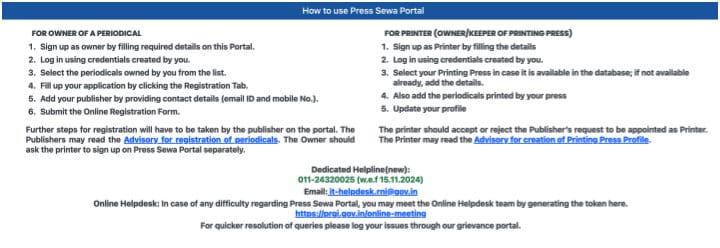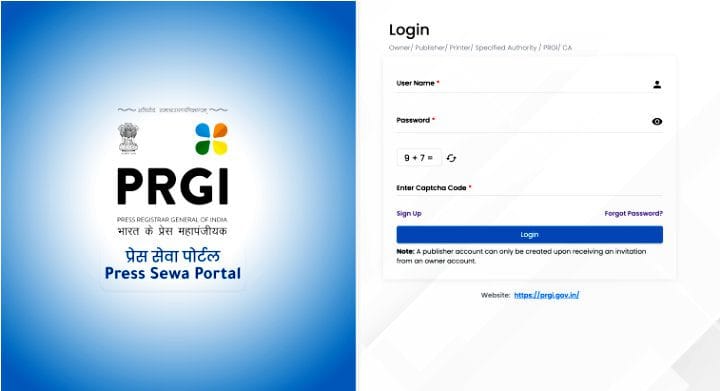Press Registrar General of India | History
The Office of the Registrar of Newspapers for India, more popularly known as RNI, came into being on July 1, 1956, on the recommendation of the First Press Commission in 1953 and by amending the Press and Registration of Books (PRB) Act 1867.
Newspapers and periodicals in India required registration under the PRB Act of 1867 with the Registrar of Newspapers of India (RNI) till 29 February 2024.
On August 3, 2023, the Rajya Sabha passed the Press and Registration of Periodicals Bill 2023 to simplify the registration of periodicals. It proposes to repeal the PRB Act 1867.
According to the 1867 Act, no newspaper or periodical should bear a title that is the same or similar to any other newspaper or periodical already being published, either in the same language or state, unless the same person also owns the latter.
The 2023 Act allows newspapers, periodicals, and books to be registered. It also provides for cataloging books. The bill provides for the registration of periodicals, which include any publication containing public news or comments on public news. Periodicals do not include books or scientific and academic journals.
The 2023 Act provides that a declaration specifying the printer or publisher be made to the District Magistrate (DM). The DM sends the declaration to the press registrar, who then issues a registration certificate.
The Press and Registration of Periodicals (PRP) Act, 2023, and the Press and Registration of Periodicals (PRP) Rules, 2024, took effect on 1 March 2024. This legislation now governs the registration and publication of periodicals, including newspapers, and the notification process for printing presses. Additionally, the PRB Act of 1867 will be repealed upon implementing the PRP Act.

The PRP Act establishes the role of the Press Registrar General of India to fulfill its objectives. The Press Registrar appointed under the PRB Act has assumed the position of Press Registrar General. The office of the Registrar of Newspapers of India (RNI) is now called the Office of the Press Registrar General of India (PRGI). PRGI also determines if a newspaper organization can own a particular title.
The Office of the Press Registrar General of India is in New Delhi. It has three regional offices in Calcutta, Mumbai, and Chennai to cater to the needs of publishers in all corners of the country.
Press Registrar General of India | Functioning
The ‘Press Sewa Portal‘ is the online portal developed by the Press Registrar General for receiving various applications, intimations, and documents required under the PRP Act and Rules. Certificates of registration of periodicals are also issued on the portal.
Stakeholders such as owners, printers, and publishers can register on the portal, create profiles, and request services offered through it.

The following services are/will be available on the portal:
- Intimation by printer of a periodical as specified in Sec. 3 of the PRP Act.
- Publisher’s application for a new registration certificate, including a facsimile edition of a foreign periodical. A “facsimile edition” of a periodical means an exact reproduction of the original edition of a foreign publication in English or an Indian language included in the Eighth Schedule to the Constitution.
- An application form is used to revise details in the registration certificate, including language, periodicity, publication location, printer/printing press, editor, publisher, price changes, and transfer of ownership.
- Ceasing of publication.
- Filing of the annual statement.
- Payment of penalties.
- Apply for verification of circulation of a periodical.
- Submit a copy of the periodical for regularity.
Press Registrar General of India | Registration of Periodicals

The following steps need to be followed to apply for registration of a periodical:
- The title owner sets up a profile on the portal.
- If the owner has registered titles, they should be mapped from the existing RNI database.
- The owner submits details on language, periodicity, proposed publication location, and title options to apply for a new title. The Title Allocation Guidelines should be carefully followed when selecting title options. Applications that do not comply with the Guidelines shall be rejected.
- The owner invites the designated publisher on the portal by providing their name, email ID, and mobile number. The relevant option can be selected if the owner is also the publisher.
- The publisher receives a link from the portal, creates a profile, and submits a registration application with the necessary details. The fee is paid online through BharatKosh using an Aadhaar-based e-signature. An application submitted without an e-signature will not be entertained.
- The Press Sewa Portal generates an acknowledgment with a unique 10-digit applicant reference number (ARN). The publisher will use the ARN for all future correspondences and references.
For a new press starting after 1 March 2024, an intimation must be sent to the Press Registrar General of India and the specified authority on the Press Sewa Portal within thirty days of commencing operations.
The physical submission of applications and authentication by the area magistrate required under the PRB Act, 1867 has been eliminated in the PRP Act.
Press Registrar General of India | Verification of Periodicals

The new PRP Act 2023 replaces the two separate processes of title verification and registration with a single online periodic registration process.
The publisher applies to the Press Sewa portal. The Press Registrar General of India checks the application for completeness, fee payment, guideline compliance, and other required details. Any deficiencies will be communicated within 7 working days of receiving the application.
The publisher must correct these deficiencies within 30 days. Failure to address deficiencies within 30 days may result in application rejection.
Once deficiencies are addressed, it will be sent to the Specified Authority by the Press Registrar General of India through the Portal. The Specified Authority will provide no objections or comments within the designated timeframe.
If the Press Registrar General of India denies registration, the publisher receives an online communication detailing the reasons. The publisher must submit a reply on the Press Sewa Portal within 10 days. The Press Registrar General of India may grant or refuse registration after reviewing the reply. A speaking order outlining the reasons is sent to the publisher via the Press Sewa Portal if registration is denied.




